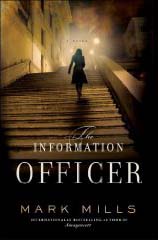Maltese Vulture

Apparently British author Mark Mills's third novel, The Information Officer (Random House) is something of a departure from his bestselling suspense thrillers, Amagansett and The Savage Garden, else I might have made his and their acquaintance sooner.
And the credibility of those who blurb(ed) his new title didn't hurt either. Novelist William Boyd (Ordinary Thunderstorms) exclaims: "A forgotten corner of World War II rediscovered and expertly revealed to us. Fascinating and shrewdly compelling." George Pelecanos (The Way Home, The Wire, and the eagerly awaited Treme) praises: "A lush, romantic thriller, skillfully crafted by master stylist Mark Mills."
So, that's how I came to open Mills's new tome. What kept me turning the pages were a series of small, brilliant turns and at least one major feature--that being the masterful pacing of this story, set on the besieged British-controlled Mediterranean island of Malta ("little lump of rock in the middle of the Med") in 1942 as the Axis is bombing this small way station to smithereens. Malta was the most bombed piece of real estate in the European theater and hasn't been on literary center stage since Thomas Pynchon's hilarious early novel, V.
After some foreshadowing preliminaries, the main action begins at one of those well-known devices, the British Imperial cocktail party--this one held at the villa occupied by the garrison's commander and nicely balanced by flirtation and affairs hinted at and wartime conversations of various R.A.F., submariners, an American liaison officer, a British military doctor, and Max Chadwick, the information officer of this book's title. It is Chadwick's misnamed duty to shape the news on Malta to buoy the morale of both military personnel as well as the civilian population.
Chadwick soon learns that someone, probably a British naval officer, is sexually assaulting and murdering Maltese prostitutes (referred to as "sherry queens" in the contemporaneous vernacular). As he is charged with securing the tenuous Maltese loyalty to the war effort, Chadwick investigates the murder(s).
The Information Officer is nothing if not a great piece of entertaining writing--both an homage and lampoon of the compelling and atmospheric novels of Graham Greene and Eric Ambler (a banner also taken up by Alan Furst), vividly rendered and breathlessly ended.
